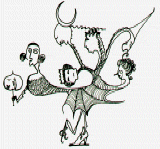|
A Georgian Mahogany Triple Opening
brass bound Writing Box circa 1815
Please click on images to enlarge
Reference: wb 115
Description:
A Georgian Mahogany Triple Opening
brass bound Writing Box circa 1815 with original inkwells and secret
drawers.
The box has the original lock
and a working key.
It also has an upright back with a
letter pocket and individual pockets.
The box is in the military style and
has countersunk carrying handles made of brass as well as brass corners
and straps.
|

Origin: United
Kingdom
Circa: 1810
Materials: Mahogany and
brass.
Size: 40.5cm by 25.5 cm by 14 cm:
16 inches by 10 inches by 5.5 inches.
Condition: Overall
good
|

|
The writing tablet is green
felt. The upper part of the box provides some privacy if writing with
someone facing
|
Please click on images to enlarge
Please click on images to enlarge
The brass is secured with
steel/iron screws. These were clearly flattened when first put in.
The corner jointing is mitered blind dovetail. The brass would hold this
together even if the glue became damp. These boxes were designed to
survive very difficult circumstances. The brass side handles are
now countersunk.
|

|

|
The box is
constructed with full blind dovetails. These can be recognized from
the outside, by the join not being to the corner. part of the bead
which has been run in, to give a sense of completeness is cross grain. |
Dovetail joints:
The dovetail joint is one
of the wonders of woodwork. In the full blind none of the careful work
is visible. If the joint is simply mitered it will not survive
atmospheric change. A mitered joint is end grain to end grain. The
glue soaks in, becomes dry and brittle and falls apart.
The dovetail joint enables
side grain to be glued to side grain. These joints would hold together
without glue!
It is the true proof of
these dovetail joints made by craftsmen 200 years ago that their
joints are as they made them.
This image is
courtesy of Fine Woodworking Techniques 1978 Taunton Press inc.
ISBN: 0918804027
You can
order the Fine Woodworking Techniques from Amazon by
clicking one of the links below:
And
from Barnes and Noble with the link below:
|
Extract: Choosing and Making the right
joints by Tage Frid.

|
Please click on images to enlarge

|
The box has a working lock and replacement key. |

|
The box
has two unmatched period inkwells. The screw top of one is a later
restoration. |
Please click on images to enlarge

|
A
|
The individual pockets
are marked in gold with the days of the week
|

|
There is a nest of three
secret drawers concealed by a sprung panel and hidden under the
pen compartments.
|

|
Please click on images to enlarge

|
Detail of the sprung
panel which hides the secret drawers. The panel is released by inserting
a rod through a hole concealed by one of the inkwells.
|
Please click on images to enlarge

|
The upper part of
the box provides some privacy if writing with someone facing. The
upper flap is an early simple form. The reminder pockets which can be
seen in the next picture were sometimes on this surface.
|
Please click on images to enlarge
Please click on images to enlarge
News
| Buying
| email | Online
History of boxes | The
Schiffer Book |
All text and images and linked images are ©
1999-2005 Antigone Clarke and Joseph O'Kelly. If you require any further
information on permitted use, or a licence to republish any material, email us
at copyright@hygra.com
| 